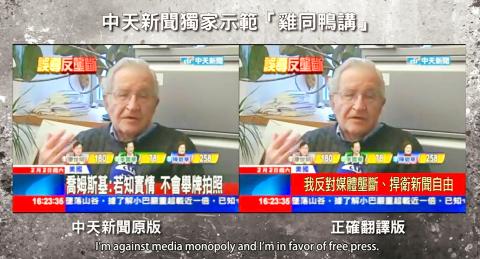CtiTV yesterday apologized for what it described as a “negligent” translation of its interview with Massachusetts Institute of Technology (MIT) professor Noam Chomsky about the ongoing controversy over the movement against media monopolization in Taiwan.
The interview, conducted last week by CtiTV Washington bureau chief John Zang (臧國華), came in the wake of a series of articles in the Chinese-language China Times — part of the Want Want China Times Group (旺旺中時集團) — alleging that Taiwanese graduate student Lin Ting-an (林庭安) had deceived Chomsky by failing to explain the slogan on a placard the professor was photographed holding that denounced “China’s black hands” interfering in local media.
Lin had contacted the 84-year-old Chomsky by e-mail to provide him with background information on the movement and fears of Chinese influence in Taiwanese media before visiting him at MIT. She made the e-mail public last week and said she had explained the situation to Chomsky before the photograph was taken.

Photo: Huang Chen-yi, Taipei Times
As reported by the Taipei Times on Saturday, Chomsky said in an official e-mail response that he did not fully understand the contents of the placard, but denied that he was misled by Lin, blaming the “misunderstanding” on his inability to read Chinese.
In his CtiTV interview with Zang, which was aired on Saturday, Chomsky said he was “misled by my lack of ability to read Chinese,” adding that he could not understand what was on the placard.
“I still don’t know what it says,” he said.
After a narration by Zang, Chomsky then said: “Sometimes it’s a conscious effort to misuse … I found out about such cases so often.”
The comments were not given any context, making it unclear if they were related to the placard, Lin’s approach or any of the sensitive political issues the professor has involved himself with over the decades.
However, Zang tied Chomsky’s remarks firmly to the controversy through a voiceover.
Soon after the interview was aired, people in the movement against media monopolization said that the captions accompanying the segment were also “misleading.”
To prove their point, they then uploaded a video on YouTube with a split screen comparing the translation made by CtiTV on the left-hand side with more accurate captioning on the right.
“Do they think we don’t understand English?” one person said in a Facebook post accompanying a link to the original interview.
In a brief statement on its Web site posted yesterday at about noon, CtiTV apologized for the poor translation of Chomsky’s remarks during the interview and attributed the errors to “negligence.”
It said the segment would be reviewed and improved.
Netizens immediately responded that the apology was inadequate, adding that they strongly doubted the errors were the result of negligent translation, but rather a deliberate attempt to mislead viewers.

A Ministry of Foreign Affairs official yesterday said that a delegation that visited China for an APEC meeting did not receive any kind of treatment that downgraded Taiwan’s sovereignty. Department of International Organizations Director-General Jonathan Sun (孫儉元) said that he and a group of ministry officials visited Shenzhen, China, to attend the APEC Informal Senior Officials’ Meeting last month. The trip went “smoothly and safely” for all Taiwanese delegates, as the Chinese side arranged the trip in accordance with long-standing practices, Sun said at the ministry’s weekly briefing. The Taiwanese group did not encounter any political suppression, he said. Sun made the remarks when

The Taiwanese passport ranked 33rd in a global listing of passports by convenience this month, rising three places from last month’s ranking, but matching its position in January last year. The Henley Passport Index, an international ranking of passports by the number of designations its holder can travel to without a visa, showed that the Taiwan passport enables holders to travel to 139 countries and territories without a visa. Singapore’s passport was ranked the most powerful with visa-free access to 192 destinations out of 227, according to the index published on Tuesday by UK-based migration investment consultancy firm Henley and Partners. Japan’s and

BROAD AGREEMENT: The two are nearing a trade deal to reduce Taiwan’s tariff to 15% and a commitment for TSMC to build five more fabs, a ‘New York Times’ report said Taiwan and the US have reached a broad consensus on a trade deal, the Executive Yuan’s Office of Trade Negotiations said yesterday, after a report said that Washington is set to reduce Taiwan’s tariff rate to 15 percent. The New York Times on Monday reported that the two nations are nearing a trade deal to reduce Taiwan’s tariff rate to 15 percent and commit Taiwan Semiconductor Manufacturing Co (TSMC, 台積電) to building at least five more facilities in the US. “The agreement, which has been under negotiation for months, is being legally scrubbed and could be announced this month,” the paper said,

MIXED SOURCING: While Taiwan is expanding domestic production, it also sources munitions overseas, as some, like M855 rounds, are cheaper than locally made ones Taiwan and the US plan to jointly produce 155mm artillery shells, as the munition is in high demand due to the Ukraine-Russia war and should be useful in Taiwan’s self-defense, Armaments Bureau Director-General Lieutenant General Lin Wen-hsiang (林文祥) told lawmakers in Taipei yesterday. Lin was responding to questions about Taiwan’s partnership with allies in producing munitions at a meeting of the legislature’s Foreign Affairs and National Defense Committee. Given the intense demand for 155mm artillery shells in Ukraine’s defense against the Russian invasion, and in light of Taiwan’s own defensive needs, Taipei and Washington plan to jointly produce 155mm shells, said Lin,